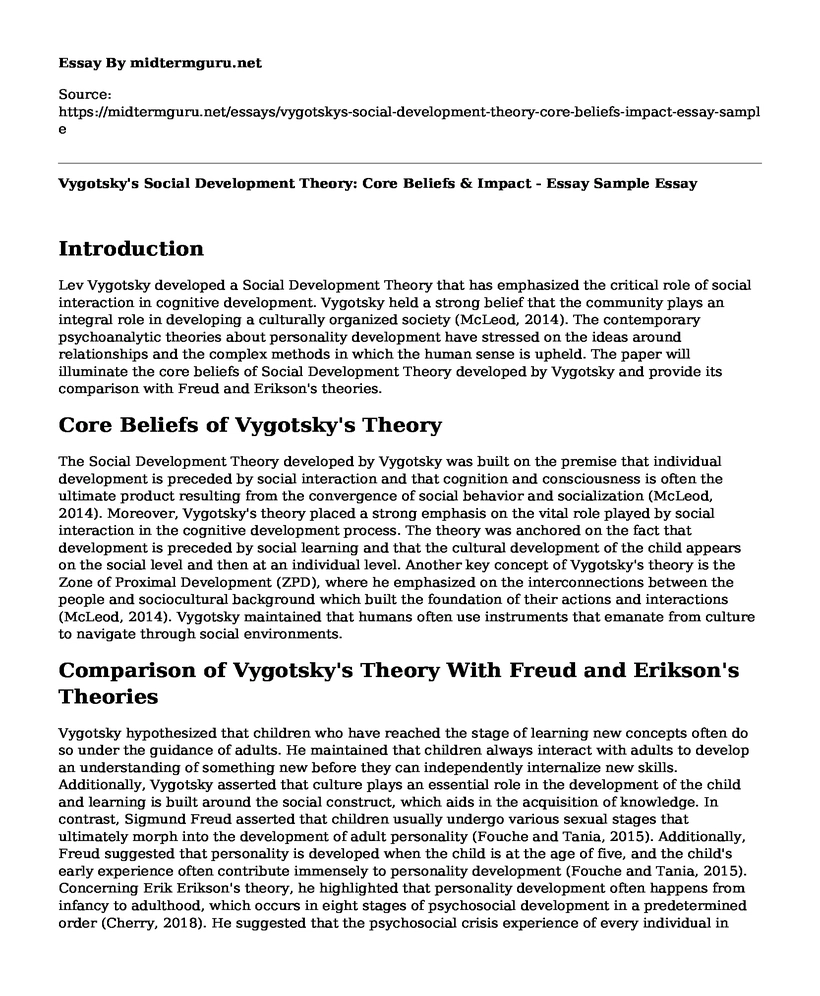Introduction
Lev Vygotsky developed a Social Development Theory that has emphasized the critical role of social interaction in cognitive development. Vygotsky held a strong belief that the community plays an integral role in developing a culturally organized society (McLeod, 2014). The contemporary psychoanalytic theories about personality development have stressed on the ideas around relationships and the complex methods in which the human sense is upheld. The paper will illuminate the core beliefs of Social Development Theory developed by Vygotsky and provide its comparison with Freud and Erikson's theories.
Core Beliefs of Vygotsky's Theory
The Social Development Theory developed by Vygotsky was built on the premise that individual development is preceded by social interaction and that cognition and consciousness is often the ultimate product resulting from the convergence of social behavior and socialization (McLeod, 2014). Moreover, Vygotsky's theory placed a strong emphasis on the vital role played by social interaction in the cognitive development process. The theory was anchored on the fact that development is preceded by social learning and that the cultural development of the child appears on the social level and then at an individual level. Another key concept of Vygotsky's theory is the Zone of Proximal Development (ZPD), where he emphasized on the interconnections between the people and sociocultural background which built the foundation of their actions and interactions (McLeod, 2014). Vygotsky maintained that humans often use instruments that emanate from culture to navigate through social environments.
Comparison of Vygotsky's Theory With Freud and Erikson's Theories
Vygotsky hypothesized that children who have reached the stage of learning new concepts often do so under the guidance of adults. He maintained that children always interact with adults to develop an understanding of something new before they can independently internalize new skills. Additionally, Vygotsky asserted that culture plays an essential role in the development of the child and learning is built around the social construct, which aids in the acquisition of knowledge. In contrast, Sigmund Freud asserted that children usually undergo various sexual stages that ultimately morph into the development of adult personality (Fouche and Tania, 2015). Additionally, Freud suggested that personality is developed when the child is at the age of five, and the child's early experience often contribute immensely to personality development (Fouche and Tania, 2015). Concerning Erik Erikson's theory, he highlighted that personality development often happens from infancy to adulthood, which occurs in eight stages of psychosocial development in a predetermined order (Cherry, 2018). He suggested that the psychosocial crisis experience of every individual in each stage have the potential of bringing either a positive or negative outcome on the personality development of an individual (Cherry, 2018).
It is imperative to note that Vygotsky's theory makes great sense, particularly in the contemporary world, where he argued that the environment in which the children live would have a bearing on their thinking and actions. Furthermore, the theory makes more sense compared to others particularly because it emphasizes the fact that cognitive development is anchored on social interactions and the children often learn new ideas from adults before they can develop internal skills (McLeod, 2014). Undeniably, adults often pass their cultural tools, especially on intellectual adaptation that can be internalized by children, and this promotes the relevance of Vygotsky's theory in the contemporary world.
Conclusion
It should be noted that the work of Vygotsky has gained much prominence, particularly in the research of cognitive development. Community is often attributed to the construction of an organized cultural setting which provides an environment in which the children can learn new methods and ideas from the adults. Sigmund Freud highlighted that before children grow into adults, they often undergo different sexual development stages that are responsible for the development of their adult personality. Also, as suggested by Erikson, the early experiences of the child often influence the development of their personality.
References
Cherry, K. (2018). Erik Erikson's Stages of Psychosocial Development. Retrieved Juny, 5, 2018.
Fouche, P., & Holz, T. (2015). Roald Dahl: A psychosexual developmental trajectory study illustrated within psychobiography. Journal of Psychology in Africa, 25(5), 403-413.
McLeod, S. (2014). Lev Vygotsky. Simply psychology, 1-13.
Cite this page
Vygotsky's Social Development Theory: Core Beliefs & Impact - Essay Sample. (2023, Feb 08). Retrieved from https://midtermguru.com/essays/vygotskys-social-development-theory-core-beliefs-impact-essay-sample
If you are the original author of this essay and no longer wish to have it published on the midtermguru.com website, please click below to request its removal:
- Annotated Bibliography on Mother Tongue Influence in English Communication - Paper Example
- Discussion: Free Speech and Social Networking
- The Tragedy of the Commons - Essay Sample
- Case Study on James Post Traumatic Stress Disorder
- Book Analysis Essay on "Woman on the Edge of Time"
- My Education Journey: A Rewarding Experience Despite Challenges - Essay Sample
- Developing Personal Qualities: Initiating Communication & Relationship Management - Essay Sample







